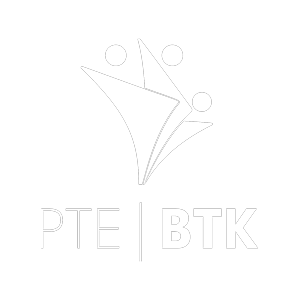Overview of the bachelor thesis (‘Capstone’) process and rules at PTE BTK Liberal Arts programme
The Capstone1 is the culmination of skills, knowledge, and approaches students have acquired from their curriculum, and therefore it must be completed during their final semester. Students are expected to carry out research under the supervision of a faculty member. The research process should include the following activities: gather information and sources, formulate a thesis statement or research question, situate their research within an academic field of study, set objectives for the project, establish a methodology, and communicate their findings clearly and coherently in a polished piece of scholarly work.
Intended learning outcomes:
1. The student can identify a suitable topic for Capstone research, formulate and articulate objectives of a thesis, and situate this within an academic field of study.
2. The student can analyse and evaluate the most relevant scholarly work of the chosen academic field of study and synthesise this within the thesis.
3. The student can locate and use a suitable methodology and can effectively and professionally engage with primary or secondary data sources to develop the thesis objectives.
4. The student can interpret and critically evaluate key findings and connect them to foundational concepts within an academic field of study.
5. The student can write a comprehensive and coherent thesis that meets the requirements of academic writing in the academic field of study.
6. The student can effectively communicate the results of their research through writing as well as discussing and/or presenting.
7. The student works independently, shows initiative, and takes ownership of the Capstone process and results.
A bachelor thesis can only be written in the field of the student’s major, whether the work is focused on one discipline or incorporating several disciplines within their major. Every student will need a supervisor for their research project. It is the student’s responsibility to find an appropriate supervisor for their Capstone.
Students can only be supervised by a Lecturer of the Institute of Philosophy, Art Theory and Classical Studies - faculty staff members, or faculty staff members teaching at PTE on a short-term basis. The supervisor should preferably hold a PhD and have a background, either in teaching or in research, in the student’s major. The supervisor is the formal examiner and will be in charge of finding a reader. Readers must also be Lecturers of the Institution.
Students are advised to start thinking about and contacting possible supervisors at the end of the fourth semester or early in their fifth semester. The supervisor must be contacted and the student's topic accepted by the 3rd week of the 5th semester (September).
The student and supervisor should meet on a regular basis but at least four times. The suggested meeting times are the following: an initial meeting to discuss the student’s initial ideas for the final thesis; a meeting when the research proposal is completed; a meeting for in depth discussion of the readings of the bibliography required for the thesis; a meeting when a chapter of the final thesis is completed. The supervisor must be satisfied that the topic and approach discussed in the research proposal are sufficient and feasible; additionally, the research proposal must serve as an assurance that the supervisor and student share the same expectations in terms of research goals, activity, and workload.
The role of the supervisor is to guide the student through the entire process. Supervisor responsibilities include: • Providing guidance, suggestions and written critique; • Setting up at least four meetings with the student; • Monitoring progress; • Confirming that all thesis requirements have been met; • Finding and assigning a reader; • Submitting the final grade, via the appropriate grading form.
The role of the reader is to evaluate the Final Thesis. They are not to be involved in the process of writing; their role is only to independently assess the Final Thesis.
For length and formal requirements of the Final Thesis see the Faculty homepage Thesis formal requirements - Author's Guidelines
The completed thesis must be uploaded to the Neptun study system by the deadline given in each academic year. Once you have uploaded your thesis to the Neptun system, it will be available to the supervisor and the reader. They will grade and provide substantive written feedback on the Final Thesis. The supervisor and the reader will each ask two questions in writing to be answered by the student during the oral presentation. They record the grade, the evaluation and the questions in Neptune. Neptun will send you a message about this.
As part of the final exam (https://btk.pte.hu/en/definitions-averages-exams) an oral evaluation/presentation of the Final Thesis is required, it is meant as a concluding moment of the capstone. The aim of this evaluation is to assess the student’s communication skills; specifically, the supervisor should assess the student’s ability to display subject mastery, manage a discussion based on the questions included in the thesis evaluation format.
Students will have a maximum of 20 minutes to present the thesis, 5 minutes to answer questions from the opponent and supervisor, and up to 5 minutes to answer questions from the audience.
Students are expected to speak freely for both the presentation and the answers, read-outs are not acceptable, the ppt is intended as an outline for the presentation. Besides the supervisor and the reader, other faculty members of the given department are present, and fellow students can be part of oral presentation and discussion. About the further requirements of the final exam you should find information under the description of the different majors.
As for the format of the presentation, please use this template and in general use a moderate design in keeping with the style of academic writing.
